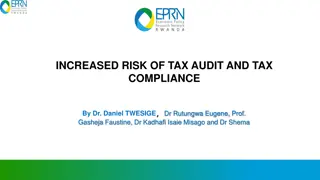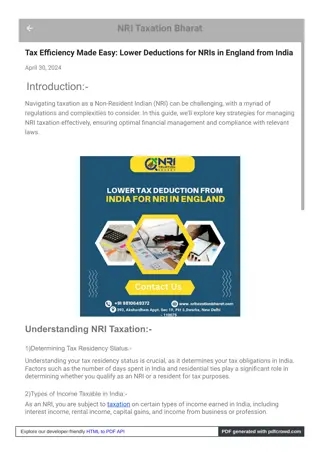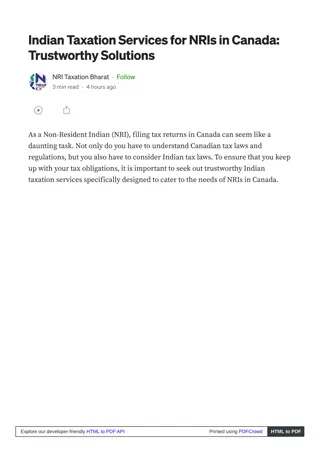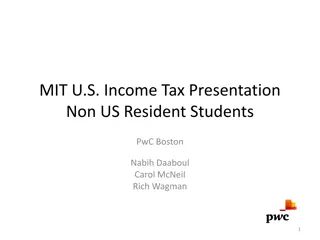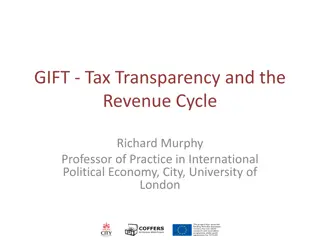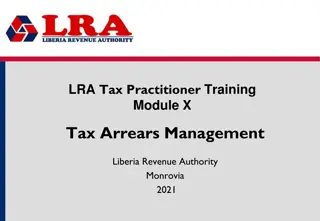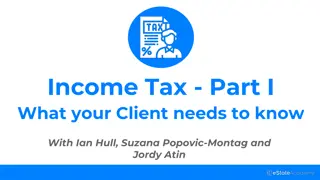Tax Certainty
Heightened concerns about uncertainty in tax matters, discussing the impact on business activities and growth. International policy initiatives to bring certainty, and how to enhance tax certainty for better economic outcomes. Theoretical and empirical studies on the negative effects of tax uncertainty on investment and economic growth.
Download Presentation

Please find below an Image/Link to download the presentation.
The content on the website is provided AS IS for your information and personal use only. It may not be sold, licensed, or shared on other websites without obtaining consent from the author.If you encounter any issues during the download, it is possible that the publisher has removed the file from their server.
You are allowed to download the files provided on this website for personal or commercial use, subject to the condition that they are used lawfully. All files are the property of their respective owners.
The content on the website is provided AS IS for your information and personal use only. It may not be sold, licensed, or shared on other websites without obtaining consent from the author.
E N D
Presentation Transcript
Tax Certainty PLATFORM FOR TAX GOOD GOVERNANCE Brussels, 15 June 2017 Antonella Caiumi, DG Taxud.D4
Tax certainty Hot topic in EC agenda: discussion at ECOFIN meeting in April The object is to take as a Union a proactive stance to create a more growth-friendly environment in the EU This presentation Which is the impact of uncertainty in tax matters on business activities and growth? How recent policy initiatives at the international level bring certainty, with a focus on the EU Way forward? how to enhance tax certainty
Background Heightened concerns about uncertainty in tax matters High global economic and political uncertainty Changes in international tax rules Emergence of new business models Discussion at the G20 High-Level Tax Symposium, July 2016 G20 Summit asked OECD and IMF to work on TU, September 2016 IMF-OECD Report delivered to G20 Finance Ministers, March 2017 Discussion will continue at the G20 Leader's Summit in July
How and Why can Tax Uncertainty arise? Uncertainty may arise from overall taxation policy (Macro level) Overall level of tax revenues/tax mix Difficulties to estimate future tax payments (Micro level) Announced tax reform may not take place/timing and direction of the change Lack of precision of the tax code Conflicting tax provisions and interpretations over time Frequent tax changes often to change tax expenditures Different tax rules applied in cross-border situations At the EU level, tax complexity due to 28 national systems main obstacle to complete the Single Market
Tax uncertainty and Investment Theoretical studies show tax uncertainty is very likely to have negative effects on investment and growth under realistic assumptions investment irreversibility more complete theoretical frameworks including monetary policy, market power and price stickiness for very relevant cases for economic growth, like innovative firms and start-ups
The Economic Impact The empirical evidence suggests a sizable negative relationship between tax uncertainty and economic outcomes, although still limited due to measurement issues How to measure tax uncertainty? MACRO DIMENSION Tax Uncertainty can be measured by counting specific words in the news or by the value of tax provisions set to expire in the near future MICRO DIMENSION Tax Uncertainty can be modelled, for instance, based on factors like presence of multiple rates, presence of ambiguous language, changes in tax parameters in opposing directions
Tax uncertainty and tax avoidance Some studies also suggest a positive association between the uncertainty in firms' tax bill and corporate tax avoidance IMPLICATION: increasing tax uncertainty drives to more complex tax planning structure, and in turn this contributes to more tax uncertainty.
Policies' effectiveness in enhancing tax certainty Some studies show that having in place tax arrangement such as Bilateral Tax Treaties and Mutual Agreement Procedure help to improve the investment environment Also the evidence points towards joint audits, advance pricing arrangements, tax ruling as important tools to reduce or eliminate tax uncertainty
Main sources of tax uncertainty according to businesses and tax administrations IMF-OECD Report on Tax Certainty, 2017 Issues related to tax administration rank among the major drivers of uncertainty for business Considerable bureaucracy to comply with tax legislation Unpredictable or inconsistent treatment by the tax authority As regards tax administrations, the most important sources of uncertainty tax policy design and legislation dispute resolution taxpayer behavior in particular related to aggressive tax planning
Policy responses good practices Co-operative compliance regime intended to improve the dialogue between taxpayers and tax authority All recent Commission initiatives (e.g. ATAD, ATAD2, CCCTB, dispute resolution, and VAT actions) aim at creating a level playing field for all businesses in the EU Among latest developments, Member States agreed to amend the current system to resolve double taxation disputes within the EU
Way forward Domestic level Improve tax policy design Reducing complexity / improving the clarity of legislation Policy makers should establish a structured approach in managing the reform process with pre-announcement consultations, clear communication of their content and timing
Way forward - International level The best policy answers are boosting the cooperation on tax matters, developing common approaches to fighting aggressive tax planning agreeing on a clear and sustainable distribution of tax revenues for cross-border investment, and more generally on transparent and non-harmful tax competition
Questions 1. How important is tax certainty from your perspective? 2. How to achieve the right balance between tax certainty and reforms? 3. What are your ideas in good practices to address the issues?
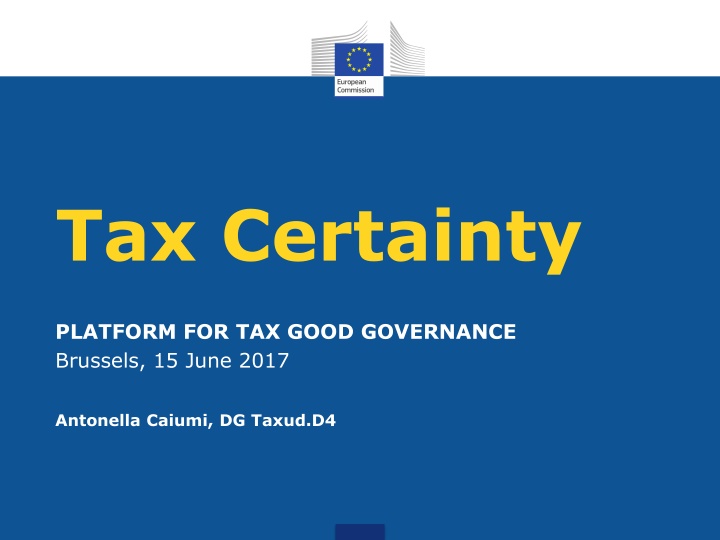

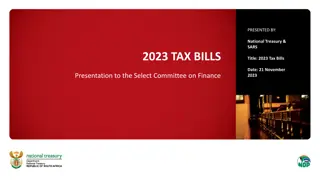

![Town of [Town Name] Real Estate Tax Rates and FY 2024 Budget Summary](/thumb/62211/town-of-town-name-real-estate-tax-rates-and-fy-2024-budget-summary.jpg)
